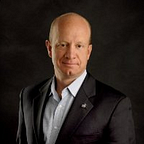It’s Time to Rethink Your Risks
In the entrepreneur’s world, size doesn’t matter.
Risk-taking is a competitive sport to some entrepreneurs.
They believe risks need to be brash and big.
My philosophy on risk is simply this. It’s all a question of return on investment. The bigger the risk, the bigger the commensurate return; the smaller the risk, then expect a smaller return. Play it safe and expect petty cash results, swing for the fences and expect to strikeout. But from time to time, with any degree of competence or skill, you can actually hit a home run.
My issue is more about making an informed decision in the first place.
If a proposition appears risky then identify the elements that you can control or influence. Work on these elements to mollify the risk and then you can more accurately measure your ROI. There are statistical and financial models that can do this for you, but I like to do those in support of my intuition.
I like to make decisions based on my experience, and based on the council I received from those around me for whom I have great respect.
I then validate that with the data and the statistical and financial models.
Look at Amazon as an example. Was pursuing a strategy of building infrastructure and ignoring the analysts in the marketplace a great risk?
Yes, it was.
Did it pay off for Jeff Bezos?
It clearly did.
His plan was well thought through, he believed in it DNA deep and he had sensible models to demonstrate to him that his intuition was right.
There are still other times when risks aren’t worth taking because you are unable to control as many of the variables as you’d like to. If you’re operating in an environment where you feel perpetually out of control, trying to mitigate your risk, you’re actually increasing it. That is going to be a low return on investment.
All too often I see folks taking huge risks without thinking it through. The risk is huge and the return is small. Why would someone sign off on that?
It’s because they don’t go through the thought process in a disciplined way. There is a minor honor in taking massive risks, but there is greater honor in thinking clearly and coming through risks with a greater return.
Too many people are so anxious to reach their goals that they don’t make a decision at all.
They will embroil themselves into dangerous circumstances by stalling on their choices. They don’t take a step back and say, “Hang on a minute, this is a decision point. What are the returns? What are the risk factors?”
When this doesn’t happen, choices become drawn out dilemmas in which problems pile up. Choices have to be made to make solutions more attainable.
Case in point: I was chatting with a programmer friend of mine and he commented about what the source of the greatest debates in their office was. It was what to set the default to in the apps that they were building. He said that they have found that most people don’t change defaults, so the providers of the software or the app can bias your use of it. He found that interesting. I did too. I find it particularly interesting because that’s how most people live their lives.
They live it by default.
In other words, by not perusing your options, you will not find the most optimal way to operate. Many of us are averse to making unnecessary decisions in general, good risk takers are the ones who look for hiding variables to make their lives easier and more controlled.
I’d also suggest taking risks earlier in your career. You can afford to take more risks for higher returns because you’ve got time to recapture and regather any loss that may occur later in your career. Obviously this should be done in moderation.
As we get older and more boring, we tend to play it safe if for no other reason that there’s no other way to make up the loss if there is one.
Having said that, though, you can still take risks later in life. Just look at Sam Walton, who was in his early 50s when he began Walmart. Everyone knows how that turned out.
No matter the risk, the point to remember is that size should not be your focus. It’s about the worthiness of the reward or the return commensurate with that risk. Analyze problems, find your intuition and data and use that to make an informed decision.
The risk almost becomes irrelevant.
Aaron Webber is a serial entrepreneur and CEO of Webber Investments LLC, as well as a Managing Partner at Madison Wall Agencies.
If you liked this post, please press the like button and leave any questions or comments below.
Check out my Quora, & LinkedIn pages for more.
